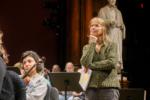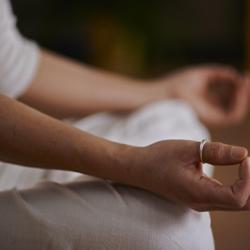As new pontificate begins, papal historians share first impressions of Francis' successor
(OSV News) -- After the entire world hears the words "Habemus Papam" and learns there's a new pope, the questions start: Who is he? What will he do, and how will he compare with previous popes?
To gather some initial answers to such questions about Pope Leo XIV, OSV News spoke with several papal historians.
"He opened with peace. That was just glorious," said Thomas F.X. Noble -- former chair of the Department of History and director of the Medieval Institute at the University of Notre Dame -- noting Pope Leo's first public words, "Peace be with you!"
"It's hard to imagine a more kind, a more gentle, a more pastoral opening," Noble reflected. "Two or three times, he mentioned mission and missionaries. And what I heard there was Pope Francis. Go to the margins. Go find the least, the last, the forgotten."
Noble discerned a potential message to the Trump administration in Washington, given Leo XIV's multiple mentions of bridges.
"Obviously, Francis rebuked Trump about building bridges not walls," observed Noble. "Was that a rebuke, or was that simply a statement of saying, 'OK, here's where we're going to go; here's what we want to do'?"
Noble also questioned whether Pope Leo's emphasis on God's universal love was meant to underscore acceptance of traditionally marginalized groups.
"He repeated, ‘God loves everyone.' Is that a shot across the bow of people who don't like, let's say, LGBTQ Catholics? I don't know," Noble said. "That struck me as really powerful. He repeated that again and again and again. God loves everybody. That's Francis. So that is, it seems to me, a very powerful kind of continuity."
Prior to Pope Leo's election, Noble was uncertain if one of Pope Francis' signature achievements, the Synod on Synodality was destined to die a quiet death. The synod -- a three-year, worldwide church process -- actively sought to engage a diversity of voices in collective church discussion and decision-making.
"I really wondered whether Francis' successor would commit to synodality," he said. "From an historical point of view, from an ecclesiological point of view, that was the big thing Francis did. Never mind him saying, 'Who am I to judge?' No, that's not the big thing."
In previous comments as a cardinal-designate in 2023, Pope Leo praised synodality as a way to address division in the church, sharing his conviction that "all of us are called to walk together … to truly search for the will of God and the presence of the spirit listening to one another and carry on this mission of service and love that is so central to the very meaning of what Church is about."
"I thought Pope Leo's statement about synodality was the most powerful single thing he said," Noble declared. "I thought, wow. That matters. That really matters."
When Pope Francis was elected in 2013, "there was this sense that we needed a pastor and an administrator. And they pulled (Cardinal Jorge Mario) Bergoglio out of the hat," said Noble. "So what did we need this time? … We know what the very conservative folks wanted. We know what the very progressive folks wanted. I think we probably landed somewhere in the middle. "
Noble nonetheless cautioned against political labels as observers work to decode Pope Leo's words and motives. "The secular left-right spectrum simply doesn't work in the church," he stressed. "It just doesn't work."
John Frymire -- an associate professor of history at the University of Missouri, and during the 1990s part of a small academic team granted access to the Vatican's so-called "Secret Archives" -- also sensed continuity with Francis' pontificate.
"I'm coming at this as a church historian, and as a Catholic, and as a citizen of the United States," shared Frymire. "I'm thrilled that it's a United States citizen by birth. As a church historian, I'm not surprised. And the reason I'm not surprised is because -- if my math is correct -- 133 cardinals voted; 108 of them had been appointed by Francis," he noted.
Like Noble, Frymire advised that Pope Leo's new pontificate shouldn't be viewed only through the lens of secular politics."Everybody always asks, will he be conservative, or progressive, or whatever," he said. "I don't like those terms -- but the fact that it's somebody who I think follows Francis in spirit is not shocking."
That said, Frymire also felt there might be an implication to be drawn from the cardinal electors' selection of Pope Leo.
"They've done two things," he suggested. "He's an American citizen and was raised here, but has an utter international footprint and experience. And I think, again, if we could read the cardinal's minds ... some of them wanted to send a message to America and say, 'Here's your American Pope, but guess what? For some of you American Christians -- especially Catholics -- look at what this guy has to say.'"
Pope Leo's administrative and pastoral experience -- which includes assignments as the elected head of the Augustinian order for two consecutive terms, as well as a missionary and bishop in Peru -- offers an unique worldview, said Frymire.
"It's knowing the church, and looking within it," he explained, "but also understanding that your mission is to look beyond it."
Vanessa Corcoran, a medieval scholar and advising dean at Georgetown University, also emphasized Pope Leo's missionary work.
The fact that he has spent so much of his time in ministry in Latin America, particularly in Peru," she said, "I think that's really exciting."
The new pope's choice of name is significant, noted Corcoran.
"The name that he chose is mainly tied to Pope Leo XIII, who really brought the church into the modern era in terms of social justice. A lot of the reforms of the 20th century, it's kind of hard to imagine them -- even though Vatican II happened decades later -- without Leo XIII."
Leo XIII -- who reigned from 1878-1903, and convened the First Vatican Council -- penned "Rerum Novarum" (1891), widely considered the first Catholic social justice encyclical for its insistence upon the rights of workers and the dignity of labor.
"This is someone who is living the mission -- continuing, I think, the legacy of Pope Francis," Corcoran reflected.
She also admitted some astonishment at the choice of an American as pope.
"Of the global Catholic Church, Americans are 6% of Catholics. So that is a major surprise," said Corcoran. "It's the second consecutive pope to be of a religious order, which is also noteworthy."
Corcoran, too, feels the synodal emphasis cannot be overlooked.
"Pope Francis had recently called for a second gathering in 2028. And so the fact that this is going to happen now under Leo XIV's papacy, I think is really exciting. … This is of central importance to him."
Christopher Bellitto -- a professor of history at Kean University in Union, New Jersey, agreed.
"This was certainly a clear indication the cardinals want the church to continue on the synodal path that Francis laid down. … He invoked Pope Francis several times and used the words: synodal, bridges, dialogue, inclusive, peace," said Bellitto, who is the author of "101 Questions and Answers on Popes and the Papacy" (Paulist Press)
"In that sense," Bellitto continued, "it's like Paul VI's election after John XXIII started Vatican II: picking up where the prior pope left off."
Bellitto also name-checked Leo XIII and "Rerum Novarum," noting the encyclical "is essentially the Magna Carta of Catholic social justice teaching, which of course originates in the Gospel. Leo XIII placed the church fully behind workers' rights, which continues (in) John Paul II's championing of solidarity. Some conveniently forget that JP2 was as much a critic of capitalism as he was of communism."
And the surprise of an American pope?
"I'd say he's more American-born than American in the sense he's spent much of his career in Peru," reflected Bellitto. "This likely insulated him from an anti-American sentiment."
- - - Kimberley Heatherington writes for OSV News from Virginia.


















